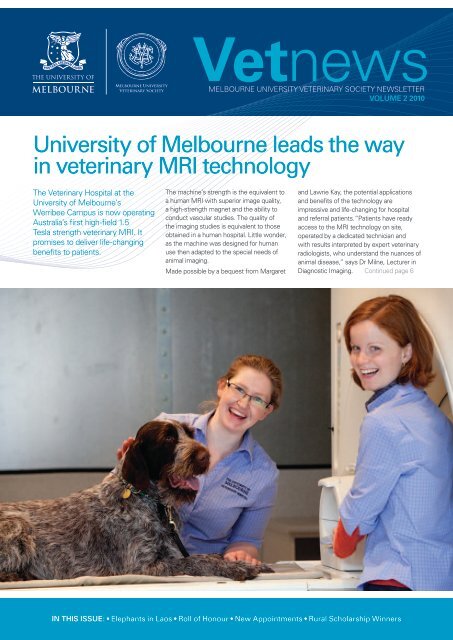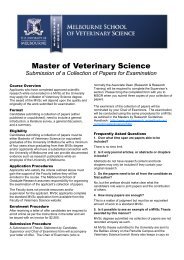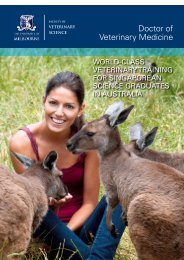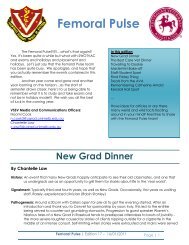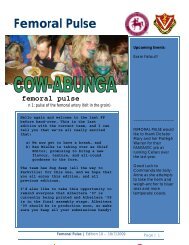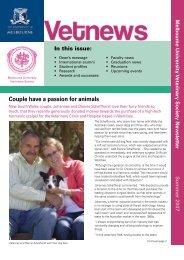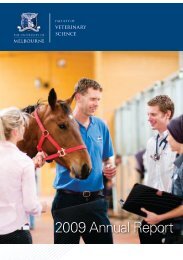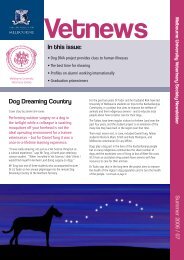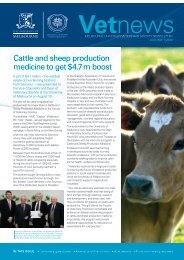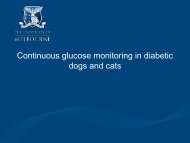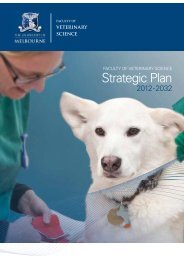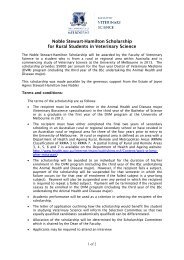Vetnews - Faculty of Veterinary Science - University of Melbourne
Vetnews - Faculty of Veterinary Science - University of Melbourne
Vetnews - Faculty of Veterinary Science - University of Melbourne
Create successful ePaper yourself
Turn your PDF publications into a flip-book with our unique Google optimized e-Paper software.
<strong>Vetnews</strong><br />
MELBOURNE UNIVERSITY VETERINARY SOCIETY NEWSLETTER<br />
VOLUME 2 2010<br />
<strong>University</strong> <strong>of</strong> <strong>Melbourne</strong> leads the way<br />
in veterinary MRI technology<br />
The <strong>Veterinary</strong> Hospital at the<br />
<strong>University</strong> <strong>of</strong> <strong>Melbourne</strong>’s<br />
Werribee Campus is now operating<br />
Australia’s first high-field 1.5<br />
Tesla strength veterinary MRI. It<br />
promises to deliver life-changing<br />
benefits to patients.<br />
The machine’s strength is the equivalent to<br />
a human MRI with superior image quality,<br />
a high-strength magnet and the ability to<br />
conduct vascular studies. The quality <strong>of</strong><br />
the imaging studies is equivalent to those<br />
obtained in a human hospital. Little wonder,<br />
as the machine was designed for human<br />
use then adapted to the special needs <strong>of</strong><br />
animal imaging.<br />
Made possible by a bequest from Margaret<br />
and Lawrie Kay, the potential applications<br />
and benefits <strong>of</strong> the technology are<br />
impressive and life-changing for hospital<br />
and referral patients. “Patients have ready<br />
access to the MRI technology on site,<br />
operated by a dedicated technician and<br />
with results interpreted by expert veterinary<br />
radiologists, who understand the nuances <strong>of</strong><br />
animal disease,” says Dr Milne, Lecturer in<br />
Diagnostic Imaging. Continued page 6<br />
IN THIS ISSUE: • Elephants in Laos • Roll <strong>of</strong> Honour • New Appointments • Rural Scholarship Winners
WELCOME<br />
President’s Message<br />
It is with great pleasure and genuine excitement that I welcome all <strong>of</strong> our<br />
alumni, faculty staff, students, affiliates and friends to this edition <strong>of</strong> VetNews,<br />
my first since becoming President <strong>of</strong> MUVS.<br />
With the recent establishment <strong>of</strong> a taskforce, MUVS is committed to strengthening its<br />
relationship with our Alumni, the <strong>Faculty</strong> and the <strong>University</strong> by investigating and introducing<br />
new ways in which we can communicate and encourage participation. As part <strong>of</strong> the MUVS<br />
development process we have already rejuvenated our website and launched a Facebook page<br />
in recent months, with more to come in due course. You can find out more about our exciting<br />
plans in my article on page 7.<br />
Dr Joseph Galbally, BVSc (Hons.) 1982<br />
President, <strong>Melbourne</strong> <strong>University</strong> <strong>Veterinary</strong> Society<br />
Dean’s message<br />
Contents<br />
ALUMNI AT WORK 3<br />
FACULTY NEWS 6<br />
EVENTS 8<br />
REUNIONS 11<br />
NEW<br />
APPOINTMENTS 12<br />
SCHOLARSHIPS 14<br />
IMPORTANT DATES 16<br />
T.S. Eliot wrote in Quartets that<br />
“we had the experience but<br />
missed the meaning” implying<br />
that it is possible to make the<br />
journey, but not come away with<br />
the essential purpose.<br />
This is not true <strong>of</strong> veterinary graduates<br />
<strong>of</strong> the <strong>University</strong> <strong>of</strong> <strong>Melbourne</strong>, whose<br />
education has always been marked as<br />
much by the meaning as by the journey. A<br />
veterinary education at <strong>Melbourne</strong> is more<br />
than just the journey <strong>of</strong> attending lectures,<br />
tutorials, and practical exercises. It is about<br />
gaining meaning from the close and caring<br />
pr<strong>of</strong>essional relationships with members<br />
<strong>of</strong> staff, the VSSV activities, “O” week,<br />
talent night, Kendall Hall sports teams,<br />
bonding during late nights in the equine<br />
centre, tutorials on the lawn in front <strong>of</strong> the<br />
<strong>Veterinary</strong> Hospital, “Friday Things” in the<br />
VRI courtyard, and many and much more.<br />
It is the quality <strong>of</strong> the combined educational<br />
<strong>of</strong>ferings and the extracurricular activities<br />
that provide the meaning. The result is<br />
that, the veterinary program at <strong>Melbourne</strong><br />
is consistently ranked by veterinary<br />
graduates in the national Course Evaluation<br />
Questionnaire as the top ranked course<br />
for provision <strong>of</strong> generic skills and the top in<br />
two <strong>of</strong> three years, and equal top last year,<br />
in quality <strong>of</strong> teaching. We clearly achieve<br />
assisting students through the journey, and<br />
in doing so add the meaning.<br />
Our intent is that the curriculum in the<br />
DVM, in which we enrol our first students<br />
in 2011, provide both an excellent journey<br />
and substantive and special meaning. To do<br />
so, we are introducing a new, progressive<br />
and contemporary veterinary curriculum that<br />
will enhance our already strong capacity to<br />
deliver meaning to the veterinary course.<br />
You can read more about the DVM on<br />
our website, or feel free to contact me for<br />
further information.<br />
Finally, this issue <strong>of</strong> <strong>Vetnews</strong>, which is<br />
perhaps our largest to date, highlights<br />
the achievement <strong>of</strong> some <strong>of</strong> our alumni,<br />
provides an update on the exciting changes<br />
in our largest teaching unit, the <strong>Veterinary</strong><br />
Hospital, which include appointment <strong>of</strong> a full<br />
time Executive Director and a new Board<br />
<strong>of</strong> Management chaired by alumnus Dr<br />
Charles Foster. As you will read in this issue,<br />
we recently commissioned a 1.5T MRI that<br />
compliment our suite <strong>of</strong> imaging modalities<br />
to provide us with the most comprehensive<br />
veterinary imaging facility in Australia.<br />
Most importantly, it is also our pleasure<br />
to introduce you, through this newsletter,<br />
to new members <strong>of</strong> the academic staff.<br />
These new staff members join a group <strong>of</strong><br />
veterinary educators and researchers noted<br />
for their excellence.<br />
I invite you to browse through the pages<br />
<strong>of</strong> <strong>Vetnews</strong> and as you do so, to consider<br />
how we ensure that we add meaning to the<br />
journey that is our veterinary education.<br />
Pr<strong>of</strong>essor Ken Hinchcliff<br />
2 www.muvs.unimelb.edu.au
ALUMNI AT WORK<br />
<strong>Veterinary</strong> science, personal training<br />
and the elephants <strong>of</strong> Laos...<br />
<strong>University</strong> <strong>of</strong> <strong>Melbourne</strong> veterinary science graduate Emma Zalcman has been gaining amazing work and life<br />
experiences since completing her degree in 2009.<br />
Her childhood love <strong>of</strong> elephants – and some<br />
up-close encounters with them as a teenager<br />
– made the decision to become a volunteer<br />
veterinarian with ElefantAsia a natural choice.<br />
ElefantAsia is a French NGO attempting to<br />
save the Asian elephant in Laos through<br />
a combination <strong>of</strong> breeding programs and<br />
work to improve the health <strong>of</strong> the current<br />
population.<br />
Once known as the ‘land <strong>of</strong> the million<br />
elephants’ Laos has seen its population<br />
dwindle to less than 1500, <strong>of</strong> which 500 are<br />
‘owned’ elephants working in the logging<br />
industry. This creates difficulties when<br />
attempting to improve dangerously low<br />
breeding levels as owners are reluctant<br />
to let their elephants participate in vital<br />
pregnancy programs or the elephants are<br />
too overworked to breed. Add to this the<br />
problem <strong>of</strong> poaching and habitat destruction<br />
– and the lack <strong>of</strong> veterinary science training<br />
in Laos – and the work <strong>of</strong> ElefantAsia<br />
becomes even more crucial.<br />
‘To be honest, the future is very bleak for<br />
elephants in Laos. Reproduction rates are<br />
dangerously low and, as the population<br />
ages, the number <strong>of</strong> potential breeders<br />
is rapidly declining,’ says Emma. ‘Given<br />
ElefantAsia is the only organisation <strong>of</strong> its<br />
kind in Laos, extinction <strong>of</strong> the elephant in<br />
Laos would almost be inevitable (without<br />
their work).’<br />
Continued page 4<br />
www.muvs.unimelb.edu.au 3
ALUMNI AT WORK<br />
<strong>Veterinary</strong> science, personal training and the elephants <strong>of</strong> Laos...<br />
(CONTINUED FROM PAGE 3)<br />
Two mobile veterinary units visit<br />
domesticated elephants at their place <strong>of</strong><br />
work, conducting micro-chipping, worming<br />
and general veterinary treatment. The general<br />
health <strong>of</strong> the elephant is also discussed with<br />
the mahout (the elephant’s driver), with the<br />
Lao vet acting as translator. Importantly,<br />
reproduction is also discussed, with the aim<br />
<strong>of</strong> entering animals into a breeding contract<br />
as part <strong>of</strong> ElefantAsia’s ‘baby bonus’ scheme<br />
— an attempt to encourage mahouts to<br />
place their elephants in a breeding program<br />
in exchange for use <strong>of</strong> a motorised tractor to<br />
assist with the work usually undertaken by<br />
the elephant. The first pregnant cows from<br />
the program are expected to arrive early<br />
next year.<br />
Emma works with Dr Bertrand Bouchard, a<br />
French vet trained in Canada, and a local Lao<br />
vet (who is more like a veterinary technician<br />
by Australian standards). Her main role is to<br />
participate in the mobile unit field trips, which<br />
she thoroughly enjoys. The team stays in<br />
small guest houses in local villages, which<br />
are filled with local wildlife. In between the<br />
field trips, Emma works in the ElefantAsia<br />
<strong>of</strong>fice in Vientiane, the capital city <strong>of</strong> Laos.<br />
She writes veterinary reports and helps plan<br />
reproduction programs and other initiatives,<br />
including a recent partnership with a private<br />
company to build an elephant sanctuary and<br />
breeding centre.<br />
‘In Vientiane I live in a small house with one<br />
other young Indian girl who works at the<br />
UN. I love living in Vientiane. Every day I ride<br />
my pink bicycle to work through the dusty<br />
streets,’ she says. ‘There is a very active and<br />
interesting expat community here, many<br />
<strong>of</strong> whom are Australian and most <strong>of</strong> whom<br />
work for NGOs.’.<br />
A talented track and field athlete, Emma<br />
initially took six months <strong>of</strong>f after completing<br />
her degree to finish competing in the<br />
<strong>Melbourne</strong> athletics season. But, having<br />
made the move to Laos, her love <strong>of</strong> athletics<br />
has certainly not being wasted. Emma has<br />
started up a personal training business for<br />
the significant expat population, plays in the<br />
netball team and trains with the ALF team.<br />
What’s more, she trains with and helps to<br />
coach the Lao athletics team.<br />
‘I really enjoy the field work and in particular<br />
the challenges faced in working with such<br />
limited resources. When I first arrived I was<br />
very nervous that I might not be able to do<br />
the job. But I soon realised that ... limited<br />
resources make gold standard medicine<br />
impossible (and) … it is usually a matter <strong>of</strong><br />
applying very basic veterinary first principles.<br />
It is really rewarding to see just what a<br />
difference very simple treatment can make,’<br />
says Emma.<br />
However, there are also plenty <strong>of</strong> challenges:<br />
limited resources, the time taken to get to<br />
some remote locations for urgent treatment<br />
and the emotional effect <strong>of</strong> the living<br />
conditions for some local villagers to name<br />
but a few. On top <strong>of</strong> that, dealing with local<br />
mahouts is nothing like dealing with private<br />
clients in <strong>Melbourne</strong>. Most owners have a<br />
very limited level <strong>of</strong> education, which can<br />
make dealing with animal welfare issues<br />
difficult. Compounding matters, there is only<br />
one local Lao vet who speaks English.<br />
After a while, Emma also found her number<br />
being circulated amongst expats as a kind<br />
<strong>of</strong> free, 24-hour small animal vet for anyone<br />
wanting a second opinion.<br />
‘I soon found myself spending my lunch<br />
breaks at the local pharmacies trying to do<br />
charades to obtain the drugs I needed. Trying<br />
to charade ‘oral prednisolone’ is not an easy<br />
task!’ says Emma.<br />
‘The organisation greatly appreciates the<br />
work done by foreign veterinarians. The<br />
mobile veterinary unit is a central part <strong>of</strong> the<br />
organisation’s work. The language barrier<br />
is always a challenge but I’m slowly trying<br />
to learn Lao. My vocabulary has a strange<br />
veterinary and running focus. I knew the<br />
words for muscle cramp and diarrhoea before<br />
I knew the word for goodbye!’<br />
Emma credits her <strong>University</strong> <strong>of</strong> <strong>Melbourne</strong><br />
degree with helping her in this challenging<br />
role.<br />
‘I think when I first arrived I underestimated<br />
just how much my degree has prepared<br />
me for a diverse range <strong>of</strong> veterinary<br />
work. I also don’t think I realised just how<br />
many applications there are for veterinary<br />
knowledge. My work here has ranged<br />
from simple clinical work with an individual<br />
elephant to designing breeding programs<br />
for a group <strong>of</strong> elephants or deciding on<br />
the best way to train mahouts to detect<br />
oestrus. The course gave me the research<br />
skills to investigate these areas and then<br />
use the information obtained for practical<br />
applications,’ she says.<br />
4 www.muvs.unimelb.edu.au
ALUMNI AT WORK<br />
Looking ahead, Emma’s ultimate goal is to<br />
win acceptance into a residency program at a<br />
zoo in Australia. First, however, she plans to<br />
gain some more clinical experience, perhaps<br />
in the UK or Canada.<br />
How to help the<br />
elephants<br />
ElefantAsia is an NGO, so donations<br />
are greatly appreciated and can<br />
be made via the organisation’s<br />
website: www.elefantasia.org.<br />
Anyone interested in volunteering<br />
as a veterinarian can also find all the<br />
relevant information there.<br />
In addition, foreign veterinarians<br />
can help by sourcing and donating<br />
veterinary equipment. At the<br />
moment, ElefantAsia is looking to<br />
obtain an ultrasound machine to<br />
pregnancy test elephants involved<br />
in the baby bonus scheme. Contact<br />
emma@elefantasia.org for more<br />
information.<br />
Pr<strong>of</strong>essor Brendan Crabb –<br />
Holding The Reins<br />
As Director <strong>of</strong> the Burnet Institute, Pr<strong>of</strong>essor Brendan Crabb heads<br />
an organisation focused on helping the world’s poorest and most<br />
vulnerable people. As an individual, his work in the field <strong>of</strong> infectious<br />
diseases in humans has earned prestigious awards, including<br />
the Bancr<strong>of</strong>t-Mackerras Medal from the Australian Society for<br />
Parasitology in 2009 for his work towards a malaria vaccine.<br />
So it might come as a surprise that he cites<br />
occasions spent holding the reins <strong>of</strong> horses<br />
on farms as a major source <strong>of</strong> inspiration. Yet<br />
these experiences, which took place while<br />
he completed his PhD and post-doctoral<br />
research at the <strong>University</strong> <strong>of</strong> <strong>Melbourne</strong>’s<br />
School <strong>of</strong> <strong>Veterinary</strong> <strong>Science</strong>, have helped<br />
define his working life. In fact, the Burnet<br />
Institute’s unifying vision – “the linking <strong>of</strong><br />
research with public health outcomes” – can<br />
be traced back to those years.<br />
“It was a fantastic springboard for a future in<br />
biomedicine and biological sciences,” says<br />
Pr<strong>of</strong>essor Crabb, recalling the time he was<br />
forced to take the skills he was honing in the<br />
“comfort zone” <strong>of</strong> his lab into the field when<br />
Victorian farms were hit by a disease that<br />
caused abortions in pregnant mares.<br />
“You couldn’t hide yourself away in a lab –<br />
you were part <strong>of</strong> the response. I ended up<br />
talking on radio and speaking to owners about<br />
it, going to farms and managing the situation<br />
within a team. I remember thinking, ‘Is there<br />
any other field <strong>of</strong> molecular science where<br />
you would be exposed as much as this?’.<br />
“In situations like that, the work that you’re<br />
doing in research, which is <strong>of</strong>ten quite<br />
academic, isn’t enough; they want the new<br />
test and the new vaccine and it was that<br />
transitional aspect <strong>of</strong> science that was very<br />
real for me. A part <strong>of</strong> my course became<br />
solving a real problem for the industry<br />
and that idea – real problems solved with<br />
something practical – is the vet school way<br />
and it stuck with me.”<br />
Since completing his studies at theSchool<br />
<strong>of</strong> <strong>Veterinary</strong> <strong>Science</strong>, Pr<strong>of</strong>essor Crabb has<br />
remained local and retained close ties with<br />
the university. He still holds Pr<strong>of</strong>essorial<br />
appointments at <strong>Melbourne</strong>, La Trobe and<br />
Monash Universities and, prior to taking on<br />
his current role at the Burnet Institute, was<br />
Laboratory Head at the Walter & Eliza Hall<br />
Institute <strong>of</strong> Medical Research.<br />
Today, he is responsible for 410 staff, including<br />
honours and PhD students from <strong>Melbourne</strong><br />
and Monash Universities, and an annual<br />
Pr<strong>of</strong>essor Brendan Crabb<br />
budget <strong>of</strong> $50m. It’s a substantial step up<br />
from running a lab but he says another lesson<br />
from his time at the School <strong>of</strong> <strong>Veterinary</strong><br />
<strong>Science</strong> has stood him in good stead.<br />
“I was working with the best and brightest<br />
who, no matter what problem they are<br />
faced with, didn’t box themselves into being<br />
specialists, but had a ‘can do, we can fix it’<br />
attitude,” he says.<br />
“As a result, I rarely tend to pigeonhole<br />
myself as a researcher but have gained<br />
the unrestricted confidence that veterinary<br />
graduates have. It’s not arrogance, just<br />
confidence, and has probably been more<br />
important for me than anything else.”<br />
He says his aim now is to have the Burnet<br />
Institute recognised as Australia’s centre <strong>of</strong><br />
excellence for research in public health and<br />
education for the communities across the<br />
world that suffer the worst and have the<br />
least money. It’s an ambitious goal but one<br />
he sees reflected at the university – and the<br />
School <strong>of</strong> <strong>Veterinary</strong> <strong>Science</strong>.<br />
“I’m not a vet and was one <strong>of</strong> very few<br />
people doing a PhD at the Vet School at the<br />
time who weren’t yet it was a terrific place<br />
to do research as a science graduate,” he<br />
says. “The School <strong>of</strong> <strong>Veterinary</strong> <strong>Science</strong> is<br />
full <strong>of</strong> very high quality people who choose<br />
to put an academic life <strong>of</strong> learning ahead <strong>of</strong><br />
the dollar and has only got better since I was<br />
there.”<br />
Dr<br />
co<br />
a f<br />
Un<br />
at<br />
www.muvs.unimelb.edu.au 5
FACULTY NEWS<br />
<strong>University</strong> <strong>of</strong> <strong>Melbourne</strong> leads the way in<br />
veterinary MRI technology (CONTINUED FROM PAGE 1)<br />
Among the many benefits are:<br />
• the investigation and diagnosis <strong>of</strong><br />
hereditary brain diseases <strong>of</strong> dogs;<br />
• rapid diagnosis <strong>of</strong> seizure disorders,<br />
strokes, and acute spinal problems<br />
(allowing timely treatment);<br />
• investigation <strong>of</strong> lameness in horses (due<br />
to improved ability to view problems in<br />
ligaments, tendons and joints that are<br />
difficult to see with other techniques);<br />
• imaging <strong>of</strong> the horse brain;<br />
• accurate determination <strong>of</strong> the location and<br />
extent <strong>of</strong> s<strong>of</strong>t tissue tumours (assisting<br />
surgical planning);<br />
• non-invasive investigation <strong>of</strong> vascular<br />
shunts and thrombosis disorders; and<br />
• increasing the knowledge <strong>of</strong> the<br />
causes and process <strong>of</strong> animal diseases,<br />
such as epilepsy, brain tumours, heart<br />
conditions and degenerative joint<br />
disease.<br />
The MRI is a boost to the Hospital’s already<br />
extensive radiological services — making<br />
them the most comprehensive veterinary<br />
imaging facility in Australia. Services include<br />
radiology, the PennHIP radiograph for<br />
canine hip dysplasia testing, fluoroscopy,<br />
ultrasound, CT, and nuclear medicine.<br />
Reporting services are provided to<br />
veterinary practices nationwide, including via<br />
teleradiology services over the Internet.<br />
The MRI also highlights the comprehensive<br />
nature <strong>of</strong> the service the Hospital is able to<br />
provide: a veterinary clinic for local clients<br />
and others Australia wide, as well as allinclusive<br />
specialist services (including<br />
neurology, internal medicine, surgery,<br />
anaesthesia and critical care), with a<br />
dedicated 24-hour emergency and critical<br />
care service also on site.<br />
The MRI service is available for domestic<br />
pets (such as dogs and cats) and horses, as<br />
well as exotic pets.<br />
MRI examinations are conducted under<br />
general anaesthetic and referral to our<br />
veterinary hospital is required.<br />
For more information or to make an<br />
appointment contact 9731 2000 or<br />
vet-radiology@unimelb.edu.au.<br />
Roll <strong>of</strong> Honour<br />
The <strong>Faculty</strong> <strong>of</strong> <strong>Veterinary</strong> <strong>Science</strong> has celebrated<br />
a variety <strong>of</strong> successes this year, with our staff<br />
recognised for their endeavours in research,<br />
teaching and veterinary specialisation.<br />
Pr<strong>of</strong>essor Ian Beveridge, a pr<strong>of</strong>essor <strong>of</strong> veterinary<br />
parasitology, received the Australian <strong>Veterinary</strong><br />
Association’s (AVA) highest ranking award, the Gilruth<br />
Prize, in recognition <strong>of</strong> his contribution to veterinary<br />
science. He is internationally acknowledged as one <strong>of</strong> the<br />
foremost authorities in veterinary parasitology and is also<br />
an exceptional teacher <strong>of</strong> veterinary science students at<br />
the <strong>Faculty</strong>.<br />
Other associates <strong>of</strong> the <strong>Faculty</strong> who were recognised<br />
by the AVA this year were: alumnus Dr Laurence<br />
Gleeson, who received the Kesteven Medal; alumnus<br />
and <strong>Veterinary</strong> Hospital consultant Dr Wayne Fitzgerald,<br />
who received a Meritorious Service Award; and alumni<br />
Drs Onn Ben-David and George Smyth, who were<br />
both awarded AVA Fellowships.<br />
Pr<strong>of</strong>essor Glenn Browning was recognised for his<br />
outstanding achievements in veterinary research and<br />
academia with the Australian College <strong>of</strong> <strong>Veterinary</strong><br />
Scientists’ Ian Clunies Ross Memorial Award. As Head<br />
<strong>of</strong> the <strong>Faculty</strong>’s <strong>Veterinary</strong> Microbiology team, Pr<strong>of</strong>essor<br />
Browning’s research has made a direct contribution<br />
to the control <strong>of</strong> animal disease, through development<br />
<strong>of</strong> novel vaccines and diagnostic tests for diseases <strong>of</strong><br />
several species.<br />
Dr Andrew Fisher, the <strong>Faculty</strong>’s Associate Pr<strong>of</strong>essor in<br />
Production Animal Management and Welfare, was<br />
recently appointed a Fellow in Animal Welfare at the<br />
Australian College <strong>of</strong> <strong>Veterinary</strong> Scientists. Dr Fisher is<br />
one <strong>of</strong> only two fellows in animal welfare in Australia.<br />
Drs Marjorie Milne and Laura Fennell were also both<br />
awarded Fellowships <strong>of</strong> the Australasian College <strong>of</strong><br />
<strong>Veterinary</strong> Scientists this year. Dr Fennell completed her<br />
residency in Equine Internal Medicine at the <strong>Veterinary</strong><br />
Hospital’s Equine Centre.Dr Milne completed her training<br />
program in the <strong>Veterinary</strong> Hospital’s Diagnostic Imaging<br />
section. Their success so soon after completing their<br />
training illustrates the high quality <strong>of</strong> clinical training<br />
programs in the <strong>Faculty</strong>.<br />
Dr Josie Holmes was awarded membership <strong>of</strong> the<br />
Australasian College <strong>of</strong> <strong>Veterinary</strong> Scientists in equine<br />
surgery. Dr Holmes began her residency in equine<br />
surgery at the <strong>Veterinary</strong> Hospital earlier this year. Dr<br />
Priscilla Hodge, who joined the <strong>Faculty</strong> in 2009, was<br />
successful in her membership examinations in Pathology.<br />
Dr Brenton Chambers from the Hospital’s Small Animal<br />
Surgery section was awarded the Australian College <strong>of</strong><br />
<strong>Veterinary</strong> Scientists’ Surgery Chapter for Best Young<br />
Speaker. This award was received for a presentation he<br />
gave at <strong>Science</strong> week entitled “Thoracoscopic-assisted<br />
lung lobectomy in the dog: A Novel wound retractor and<br />
recommended portal placement sites”.<br />
PhD student Garrett Ng was recently awarded the top<br />
early career researcher prize at the “The 9th International<br />
Workshop on pathogenesis and host response in<br />
Helicobacter infections” in Denmark. Garrett is a member<br />
<strong>of</strong> the Centre for Animal Biotechnology team and is<br />
supervised by Dr Phil Sutton.<br />
Ian Beverage<br />
Dr Wayne Fitzgerald<br />
Pr<strong>of</strong>essor Glenn Browning<br />
Dr Brenton Chambers<br />
6 www.muvs.unimelb.edu.au
FACULTY NEWS<br />
<strong>Melbourne</strong> <strong>University</strong> <strong>Veterinary</strong> Society (MUVS) –<br />
Your Alumni Association<br />
(CONTINUED FROM PAGE 2)<br />
Since its inception, MUVS has endeavoured to maintain connections between the <strong>University</strong> <strong>of</strong> <strong>Melbourne</strong> <strong>Faculty</strong><br />
<strong>of</strong> <strong>Veterinary</strong> <strong>Science</strong> and its graduates, and also amongst graduates themselves.<br />
My role as President <strong>of</strong> MUVS is to build upon and enhance the<br />
core objectives <strong>of</strong> our alumni association. I took up the mantle from<br />
my predecessor, Dr Peter Cullen, who espoused great vision for the<br />
development <strong>of</strong> MUVS under his committed stewardship over more<br />
than 20 years.<br />
The core objectives <strong>of</strong> MUVS are to promote, encourage and<br />
facilitate:<br />
• communication amongst graduates <strong>of</strong> the <strong>Faculty</strong> <strong>of</strong> <strong>Veterinary</strong><br />
<strong>Science</strong>;<br />
• communication between graduates and the <strong>Faculty</strong> itself,<br />
including academic staff, undergraduate and postgraduate<br />
students;<br />
• participation <strong>of</strong> graduates in the current and future development<br />
<strong>of</strong> veterinary education in the <strong>Faculty</strong>;<br />
• philanthropic participation <strong>of</strong> both graduates and the wider<br />
<strong>University</strong> alumni network in the development <strong>of</strong> veterinary<br />
education, research and scholarship activities at the <strong>Faculty</strong>;<br />
• the continuing educational development <strong>of</strong> graduates <strong>of</strong> the<br />
<strong>Faculty</strong>;<br />
• a positive social and cultural relationship amongst graduates,<br />
the <strong>Faculty</strong>, the <strong>University</strong>, and the wider alumni community,<br />
particularly through the promotion <strong>of</strong> <strong>University</strong>, <strong>Faculty</strong> and<br />
alumni activities <strong>of</strong> relevance to <strong>Faculty</strong> graduates.<br />
It is these objectives which have been at the forefront <strong>of</strong> MUVS’<br />
purpose and development over its 25 year history.<br />
MUVS is not an association by membership but rather a network by<br />
association. Inherent within our involvement with the <strong>University</strong> and<br />
the <strong>Faculty</strong> is our relationship with the expanding network <strong>of</strong> fellow<br />
graduates linked by our common Alma Mater. The <strong>Faculty</strong>’s alumni<br />
maintain a keen determination to remain connected, as evidenced<br />
by the popularity <strong>of</strong> events such as the 2009 centenary celebrations<br />
and the regular veterinary science class reunions.<br />
However, as we progress from graduation to formulate pr<strong>of</strong>essional<br />
and family relationships there may be extended periods when our<br />
commitments leave us little time to participate in alumni activities.<br />
This makes communication the backbone <strong>of</strong> our alumni network.<br />
My vision is to expand our range <strong>of</strong> communication opportunities<br />
so that all graduates are able to maintain at the very least a passive<br />
awareness <strong>of</strong> what is happening in our alumni community.<br />
The MUVS website, along with the <strong>Faculty</strong>’s<br />
website and Facebook page, are key elements for facilitating this<br />
objective. So please explore, connect and engage with your fellow<br />
alumni, the <strong>Faculty</strong> and the <strong>University</strong>.<br />
Dr Joseph Galbally, BVSc (Hons.) 1982<br />
Staying<br />
connected<br />
through MUVS<br />
web page<br />
updates<br />
Visit the newly updated MUVS webpage at:<br />
www.muvs.unimelb.edu.au. This features news<br />
and information to keep you connected with your<br />
fellow alumni and the <strong>Faculty</strong>.<br />
News<br />
The revamped News page has a number <strong>of</strong> news<br />
items about alumni activities, reunions, whereabouts<br />
and more. We will also aim to highlight opportunities<br />
for your pr<strong>of</strong>essional development by advertising<br />
upcoming graduate scholarships and PhD<br />
opportunities.<br />
Events<br />
The Events page will keep you up to date on future<br />
events, such as class reunions. If you intend to<br />
hold an alumni event please contact us and we will<br />
advertise it for free on our webpage.<br />
Alumni pr<strong>of</strong>iles<br />
The Alumni Pr<strong>of</strong>iles page has an easy to use search<br />
function to help you find fellow alumni by:<br />
• career path<br />
• graduation year<br />
• location<br />
We are always interested in hearing what you’ve<br />
been doing since you left the <strong>University</strong>. If you’d<br />
like to share what’s been happening in your life,<br />
we’d love to hear it! So submit your pr<strong>of</strong>ile and a<br />
recent photo to vet-alumni@unimelb.edu.au.<br />
Alumni newsletter: <strong>Vetnews</strong><br />
Missed getting a past copy <strong>of</strong> <strong>Vetnews</strong>? Simply go<br />
to our Alumni Newsletter page and click on the link<br />
to open the edition you want to read.<br />
www.muvs.unimelb.edu.au 7
EVENTS<br />
Open Day – Werribee campus<br />
More than 4,000 people joined<br />
staff and students at the <strong>University</strong><br />
<strong>of</strong> <strong>Melbourne</strong> <strong>Veterinary</strong> Hospital<br />
in Werribee earlier this year for the<br />
<strong>Faculty</strong>’s Open Day. The annual<br />
event was run in conjunction with the<br />
Wyndham City Council’s Pet Expo for<br />
the first time, making it a great day<br />
for prospective students and the local<br />
community alike.<br />
Visitors found the campus alive with dog<br />
competitions, exhibitions and music. The<br />
behind-the-scenes tours <strong>of</strong> the <strong>Veterinary</strong><br />
Hospital provided an opportunity to see<br />
demonstrations <strong>of</strong> our state-<strong>of</strong>-the-art<br />
facilities, while exhibitions covering<br />
everything from alpacas to police dogs and<br />
parasites kept visitors busy. The ferrets –<br />
perennial favourites – drew a crowd, and the<br />
agility dog show’s four-legged performers<br />
kept onlookers cheering.<br />
Minister Tim Pallas, local member for Tarneit<br />
and Victorian Minister for Roads and Ports,<br />
<strong>of</strong>ficially opened the newly-refurbished<br />
lecture theatre. The additional space in<br />
the lecture theatre allowed Pr<strong>of</strong>essors<br />
Ken Hinchcliff and Bruce Parry to deliver<br />
information sessions on the new Doctor<br />
<strong>of</strong> <strong>Veterinary</strong> Medicine program to almost<br />
900 people.<br />
Top: The Hill’s Pet Nutrition dog entertained children<br />
Bottom left: Mr Tim Pallas, Minister for Roads and Ports<br />
and Member for Tarneit, and Pr<strong>of</strong>essor Ken Hinchcliff,<br />
Dean <strong>of</strong> the <strong>Faculty</strong>, with a Canine Blood Donor dog.<br />
8 www.muvs.unimelb.edu.au
EVENTS<br />
Above: <strong>Veterinary</strong> <strong>Science</strong><br />
students were on hand to answer<br />
questions and demonstrate<br />
equipment<br />
www.muvs.unimelb.edu.au 9
EVENTS<br />
White Coat Ceremony<br />
The White Coat Ceremony was held on Sunday 18 July at<br />
the Werribee Racecourse. Third year Bachelor <strong>of</strong> <strong>Veterinary</strong><br />
<strong>Science</strong> students were each presented with a white coat, the<br />
symbolic representation <strong>of</strong> becoming a healer. The ceremony<br />
celebrates their transition from detached observers <strong>of</strong> animal<br />
health and disease in the classroom to individuals actively<br />
involved in the management <strong>of</strong> the health and well-being <strong>of</strong><br />
animals in a clinical setting.<br />
The Acting Vice-Chancellor, Pr<strong>of</strong>essor John Dewar, delivered the<br />
welcome to country, while Dr Sasha Herbert (BVSc, 1993) provided an<br />
address to students, speaking about her experiences as a veterinarian. Dr<br />
Bill Harkin, President <strong>of</strong> the Victorian Division <strong>of</strong> the AVA, also addressed<br />
the students.<br />
Despite the cold and rainy weather, the event was very well attended,<br />
with proud parents, partners and friends joining students to celebrate this<br />
important step in becoming a veterinarian<br />
Ash Phipps, Student Representative<br />
Third year Bachelor <strong>of</strong> <strong>Veterinary</strong> <strong>Science</strong> students<br />
10 www.muvs.unimelb.edu.au
REUNIONS<br />
Vets gather for 30-year reunion<br />
BY VANESSA GAVENS AND TRISH STEWART<br />
May Day 2010 was lovely, sunny<br />
and autumnal in Woodend where<br />
Campaspe Country House provided<br />
the perfect setting for the<br />
gathering <strong>of</strong> 30-odd vets and<br />
partners. Some might say very odd.<br />
Some <strong>of</strong> us had not seen each other since<br />
graduation nearly 30 years ago. It may have<br />
taken a second to recognise a few, but as<br />
soon as the chins started wagging the years<br />
evaporated.<br />
We all enjoyed a lovely evening spent sharing<br />
tales old and new. Bloggs’ hilarious pun<br />
spo<strong>of</strong> speech, which left not one graduate<br />
unmentioned (and was apparently written<br />
in the back <strong>of</strong> a speeding Commodore<br />
between Wangaratta and Woodend on the<br />
way down), was a huge hit.<br />
The slide show compiled for us by<br />
the <strong>Veterinary</strong> <strong>Faculty</strong> from assorted<br />
contributions from our student days, also<br />
brought back many memories that had been<br />
deeply recessed. Perhaps the <strong>University</strong><br />
might also donate counselling? It confirmed<br />
that many males in our year had an endless<br />
fascination with cross dressing., although<br />
this would not be such a problem these<br />
days, I suspect. It turns out the most<br />
notorious <strong>of</strong> them is now happily married<br />
with seven children. Hmmmm…<br />
A bit like an Agatha Christie mystery, our<br />
numbers diminished as some left and some<br />
stayed the night. Those remaining in the<br />
morning enjoyed a sumptuous breakfast,<br />
finished <strong>of</strong>f with entertainment courtesy <strong>of</strong><br />
Sally Adams. She sang a little ditty about<br />
the BVSc (originally penned for Talent Night<br />
at Kendall Hall in 1980!) to a Gilbert and<br />
Sullivan tune with a sing-along chorus.<br />
And then there were nine who walked up<br />
Hanging Rock to finish a perfect weekend.<br />
“Miranda… Miranda….”<br />
Thanks to the <strong>University</strong> <strong>of</strong> <strong>Melbourne</strong> Vet<br />
<strong>Science</strong> <strong>Faculty</strong> for donating resources to<br />
produce the magnificent memory book,<br />
Lauren Hull for compiling the book and the<br />
slide show for us, Mark for taking great<br />
photos and everyone who came along or<br />
contributed in some way to make it the best<br />
reunion …ever. I think we might have got<br />
it right this time – no amplified balalaikas to<br />
be seen! We look forward to seeing all our<br />
classmates in another five years.<br />
The Bachelor <strong>of</strong> <strong>Veterinary</strong> <strong>Science</strong> Class <strong>of</strong> 1980<br />
www.muvs.unimelb.edu.au 11
FACULTY NEWS<br />
Dookie Visit<br />
First year veterinary science<br />
students recently completed a four<br />
day experiential learning visit to<br />
North East Victoria, based at the<br />
<strong>University</strong> <strong>of</strong> <strong>Melbourne</strong>’s Dookie<br />
Campus. It involved property visits<br />
to thoroughbred, beef cattle and<br />
alpaca studs plus wool production,<br />
dairy cattle, goat, Poll Dorset and<br />
commercial cattle farms.<br />
While away, students participated in<br />
communication and leadership activities<br />
as well as hearing about working in rural<br />
practice, possible impacts <strong>of</strong> climate<br />
change and agriculture. They attended an<br />
industry night with presentations from the<br />
Department <strong>of</strong> Agriculture, Fisheries and<br />
Forestry (who sponsored the visit), Bayer,<br />
Pfizer and Virbac representatives.<br />
Stuart Barber, who organised the trip, said:<br />
“We consider this program a vital part <strong>of</strong><br />
the education <strong>of</strong> our veterinary students, as<br />
for many students it may be the first time<br />
they have set foot on an Australian farm.<br />
Visiting farms allows students to gain an<br />
insight into Australian production systems<br />
and what farmers do, irrespective if they are<br />
international students, students from the<br />
city or those with a rural background.<br />
“We hope more students will consider a<br />
career in mixed or large animal veterinary<br />
practice and have a greater understanding<br />
and empathy for farmers. These trips also<br />
showcase how good Australian farms<br />
are and, with some <strong>of</strong> our international<br />
graduates returning home to work in<br />
government or biosecurity roles, a practical<br />
understanding <strong>of</strong> Australian production<br />
systems can be beneficial in the longer term<br />
for international trade.”<br />
Students mark lambs at the Dookie campus<br />
The students are now working on reports<br />
based on their experiences at Dookie.<br />
NEW APPOINTMENTS<br />
Hill’s Senior Lecturer in Small Animal Medicine<br />
– DR CAROLINE MANSFIELD<br />
Dr Caroline Mansfield joins the <strong>Faculty</strong> <strong>of</strong> <strong>Veterinary</strong> <strong>Science</strong> in October as the<br />
Hill’s Senior Lecturer in Small Animal Medicine as part <strong>of</strong> a new partnership<br />
between the <strong>Veterinary</strong> Hospital and Hill’s Pet Nutrition, which has also enabled<br />
the <strong>Faculty</strong> to employ a new resident in small animal medicine. She will be<br />
section head <strong>of</strong> small animal medicine, with key responsibilities in research and<br />
research training, clinical teaching and service.<br />
Dr Caroline Mansfield<br />
Dr Mansfield graduated from Murdoch<br />
<strong>University</strong> in 1993, going on to work in<br />
mixed animal and small animal practice in<br />
Australia and the UK before completing<br />
a three-year residency in small animal<br />
medicine at <strong>University</strong> College, Dublin. She<br />
returned to Australia in 2001, where she is<br />
active in the Australian College <strong>of</strong> <strong>Veterinary</strong><br />
Scientists, both as examiner and President<br />
<strong>of</strong> the Small Animal Medicine chapter.<br />
Since 2001, Dr Mansfield has been<br />
employed at Murdoch <strong>University</strong>, first<br />
as Registrar, then Lecturer, and most<br />
recently Senior Lecturer in Small Animal<br />
Medicine. Her teaching covered general<br />
medicine, oncology, respiratory medicine,<br />
immunology and gastroenterology, while<br />
she also maintained a strong commitment<br />
to continuing veterinary education, speaking<br />
nationally and internationally.<br />
Dr Mansfield brings with her an active<br />
research program in small animal medicine,<br />
with an emphasis on inflammatory bowel<br />
disease in dogs. She hopes to recruit<br />
a number <strong>of</strong> postgraduate students for<br />
new research projects in comparative<br />
gastroenterology and companion animal<br />
health.<br />
12 www.muvs.unimelb.edu.au
NEW APPOINTMENTS<br />
New Director for<br />
<strong>University</strong> <strong>of</strong> <strong>Melbourne</strong><br />
<strong>Veterinary</strong> Hospital<br />
– SHARYN THOMPSON<br />
The <strong>Faculty</strong> <strong>of</strong> <strong>Veterinary</strong> <strong>Science</strong> has appointed<br />
a new Executive Director to lead the <strong>Veterinary</strong><br />
Hospital in its ongoing expansion and capacity<br />
building program. Sharyn Thompson joined the<br />
Hospital in May and is responsible for managing<br />
the people and facilities <strong>of</strong> the <strong>Faculty</strong>’s most visible<br />
public unit.<br />
She is developing a strategy to ensure the Hospital is able to<br />
deliver high quality clinical training <strong>of</strong> undergraduate and graduate<br />
veterinarians, conduct clinical research that ranks with the best<br />
in the world, while ensuring that our patients are <strong>of</strong>fered the best<br />
veterinary care in the state.<br />
A registered nurse with over 20 years experience within both<br />
the human and animal health sectors, Sharyn joins the <strong>Faculty</strong><br />
from the Lort Smith Animal Hospital where, as Director <strong>of</strong><br />
Operations, she was responsible for overall operational and<br />
Sharyn Thompson<br />
financial management <strong>of</strong> the hospital and animal shelter. She<br />
also has experience in procurement and supply negotiation from<br />
her time with advisory firm Babcock and Brown and at Affinity<br />
Health hospital sites across the country.<br />
Sharyn, who gained her nursing degree at NSW’s Southern<br />
Cross <strong>University</strong>, brings extensive practical clinical experience<br />
to the role, having worked as a clinical nurse specialist and<br />
registered nurse in operating theatres at Cabrini, Bellbird and<br />
Royal <strong>Melbourne</strong> Hospitals. She has also completed an MBA at<br />
Monash <strong>University</strong>.<br />
New Lecturer in <strong>Veterinary</strong> Reproduction<br />
– DR NATALI KREKELER<br />
Dr Natali Krekeler became Lecturer in <strong>Veterinary</strong> Reproduction at the <strong>Faculty</strong> <strong>of</strong><br />
<strong>Veterinary</strong> <strong>Science</strong> in September after completing her PhD in molecular biology. She<br />
will develop subjects, carry out research and teach both veterinary and non-veterinary<br />
students in anatomy, biology and physiology <strong>of</strong> animal reproduction as well as<br />
veterinary clinical practice.<br />
Natali, who grew up in northern<br />
Germany, graduated as<br />
valedictorian in 2001 before<br />
completing a Doctorate degree<br />
in equine clinical research at<br />
the Free <strong>University</strong> <strong>of</strong> Berlin.<br />
Dr Natali Krekeler<br />
In 2002, she began a residency<br />
at the Cornell <strong>University</strong>, USA,<br />
pursuing her interests in reproductive medicine. She remained at<br />
Cornell as a Clinical Instructor in Theriogenology and Postdoctoral<br />
Associate in Developmental Biology until 2006, before moving to<br />
<strong>Melbourne</strong> to combine her interests in clinical work and molecular<br />
techniques.<br />
Natali brings considerable experience in teaching veterinary medicine<br />
to the position, having taught both undergraduate and graduate<br />
students at Cornell <strong>University</strong> and delivered lectures and practicals<br />
to BVSc students at the <strong>University</strong> <strong>of</strong> <strong>Melbourne</strong> in small animal<br />
reproduction.<br />
Away from work, Natali is a keen athlete, having completed 13<br />
marathons and competed in Ironman-distance triathlons. As Lecturer,<br />
she is looking forward to motivating and improving the skills <strong>of</strong><br />
students in reproductive biology, strengthening her international<br />
collaborations, and contributing to the <strong>University</strong>’s excellent reputation<br />
in canine reproductive research.<br />
www.muvs.unimelb.edu.au 13
SCHOLARSHIPS<br />
Scholarship boost for rural<br />
veterinary students<br />
Two students from country Victoria have received scholarships worth<br />
$20,000 to help fund their veterinary science studies at the <strong>University</strong><br />
<strong>of</strong> <strong>Melbourne</strong>.<br />
First year Bachelor <strong>of</strong> <strong>Veterinary</strong> <strong>Science</strong><br />
students Ben Porter and Meaghan Barrow<br />
will benefit from valuable financial assistance<br />
over the duration <strong>of</strong> their degrees, thanks<br />
to the generosity <strong>of</strong> alumni and supporters<br />
<strong>of</strong> the <strong>University</strong> <strong>of</strong> <strong>Melbourne</strong>’s <strong>Faculty</strong> <strong>of</strong><br />
<strong>Veterinary</strong> <strong>Science</strong>.<br />
Meaghan Barrow and Ben Porter<br />
The Rural <strong>Veterinary</strong> Students Scholarship<br />
and the Noble Stewart-Hamilton Scholarship<br />
are awarded annually to students moving<br />
from rural or regional areas to begin their<br />
veterinary science studies. They are awarded<br />
to students with an interest in rural practice<br />
who intend to return to regional or rural<br />
practice after graduation.<br />
Ben, the recipient <strong>of</strong> the Rural <strong>Veterinary</strong> Students Scholarship, had decided on a career as<br />
a vet by the age <strong>of</strong> six. He made sure he entered the pr<strong>of</strong>ession with open eyes, working<br />
on farms, an abattoir and a dairy processing plant around his hometown <strong>of</strong> Warragul as a<br />
teenager, along with a number <strong>of</strong> local mixed practice vet clinics.<br />
“Scholarships like this make the world <strong>of</strong> difference for rural students, and ensure that<br />
others like me are able to complete our studies and return to the country,” says Ben.<br />
Meaghan, who moved to <strong>Melbourne</strong> from her family’s farm in the Benalla region <strong>of</strong> northeastern<br />
Victoria, says: “The vet science degree is a very challenging course, which is<br />
something I like about it. The Noble Stewart-Hamilton Scholarship means I don’t have to<br />
work during semester and can spend more time on my studies and with my family.”<br />
Students in the <strong>University</strong> <strong>of</strong> <strong>Melbourne</strong>’s veterinary science program complete a range <strong>of</strong><br />
farm and rural clinic placements, while many <strong>of</strong> the <strong>Faculty</strong>’s teaching staff are leaders in<br />
the field <strong>of</strong> agricultural animal production medicine. This means they can <strong>of</strong>fer experiences<br />
<strong>of</strong> significant value to Ben and Meaghan’s career aspirations <strong>of</strong> returning to the country to<br />
work.<br />
Pr<strong>of</strong>essor Ken Hinchcliff, Dean <strong>of</strong> the <strong>Faculty</strong> <strong>of</strong> <strong>Veterinary</strong> <strong>Science</strong>, says: “These<br />
scholarships are important in assisting rural students to undertake the highly demanding<br />
veterinary science course. We are optimistic that students awarded these scholarships will<br />
return to rural areas <strong>of</strong> Australia as veterinarians.”<br />
The Rural Students Scholarship was set up by retired veterinarian Dr Bill Riches and his<br />
wife Jenny Riches in 2009. Along with helping vet students from the country, the Riches<br />
hope the fund will go some way towards addressing the shortage <strong>of</strong> vets in rural areas.<br />
The Noble Stewart-Hamilton Scholarship, donated through the estate <strong>of</strong> Joyce Agnes<br />
Stewart-Hamilton (née Noble), has been supporting rural students in veterinary science<br />
since 2008.<br />
Should you wish to contribute to the Rural <strong>Veterinary</strong> Student’s Scholarship fund,<br />
please contact Mr Peter Moran, Advancement Manager, on +61 3 8001 2420 or by<br />
email at: pgmoran@unimelb.edu.au.<br />
14 www.muvs.unimelb.edu.au
SCHOLARSHIPS<br />
Generosity <strong>of</strong> pet lovers helps<br />
broaden students’ horizons<br />
The generosity <strong>of</strong> long term clients <strong>of</strong> the <strong>University</strong> <strong>of</strong> <strong>Melbourne</strong> <strong>Veterinary</strong><br />
Hospital has enabled 16 Werribee-based veterinary science students to<br />
undertake valuable training across Australia and around the world.<br />
Hoppers Crossing couple Dale and Lynette<br />
Sayner have been taking their pets to the<br />
<strong>University</strong>’s veterinary teaching hospital for<br />
the past 15 years and, over the previous<br />
five years, they have funded travel bursaries<br />
and the purchase <strong>of</strong> equipment to help train<br />
veterinary science students.<br />
Johannes and Dianne Schelfhorst, from<br />
New South Wales, have been making<br />
regular donations to the Hospital since 2007<br />
when their dog, Tess, received life-saving<br />
surgery to remove a tumour on her spinal<br />
cord. Both couples hope their support<br />
will provide trainee veterinarians with<br />
opportunities to work with diverse species<br />
<strong>of</strong> animals in environments they may not<br />
otherwise experience.<br />
Among those to benefit from the most<br />
recent bursaries are:<br />
• Xiao Yi Niu, from <strong>Melbourne</strong>, who will<br />
use the funds to travel to the US to<br />
undertake externships at the <strong>University</strong><br />
<strong>of</strong> Pennsylvania and Colorado State<br />
<strong>University</strong>, working with small animal<br />
s<strong>of</strong>t tissue and orthopaedic surgeons.<br />
• Tessa Muir, from the UK, who is also<br />
traveling to the US for a three week<br />
externship at Rood and Riddle Equine<br />
Hospital, in Lexington, Kentucky.<br />
“I hope to get exposure to a wide variety<br />
<strong>of</strong> cases, in medicine, surgery and<br />
ambulatory fields,” says Tessa. “Through<br />
this very generous bursary I’ll gain a better<br />
understanding <strong>of</strong> the veterinary pr<strong>of</strong>ession<br />
in the USA, where I hope to apply for an<br />
internship next year.”<br />
Fellow scholarship recipients Denia Ford<br />
and Maggie Schibler are both hoping<br />
to work as country veterinarians after<br />
graduation. For them, the bursary provides<br />
an important opportunity to gain experience<br />
in rural practice by covering the extra costs<br />
associated with rural placements, such as<br />
accommodation and transport.<br />
Dean <strong>of</strong> the <strong>Faculty</strong> <strong>of</strong> <strong>Veterinary</strong> <strong>Science</strong>,<br />
Dale and Lynette Sayner, Pr<strong>of</strong>essor Ken Hinchcliff<br />
and Johannes and Dianne Schelfhorst”<br />
Pr<strong>of</strong>essor Ken Hinchcliff says: “Both the<br />
Sayners and Schelforsts recognise the<br />
value <strong>of</strong> these placements as formative<br />
experiences for students and have<br />
committed to supporting <strong>University</strong> <strong>of</strong><br />
<strong>Melbourne</strong> students. The <strong>Faculty</strong> is deeply<br />
appreciative <strong>of</strong> the support <strong>of</strong> these<br />
families.”<br />
A number <strong>of</strong> scholarships and bursaries<br />
are <strong>of</strong>fered by the <strong>Faculty</strong> each year,<br />
providing invaluable support for veterinary<br />
science students. If you would like to<br />
find out more about supporting our<br />
students, please contact Mr Peter Moran,<br />
Advancement Manager, on +61 3 8001<br />
2420 or pgmoran@unimelb.edu.au.<br />
Dr Ted Whittem, Dale and Lynette Sayner, Pr<strong>of</strong>essor<br />
Ken Hinchcliff and Johannes and Dianne Schelfhorst<br />
and travel bursary recipients<br />
www.muvs.unimelb.edu.au 15
IMPORTANT DATES<br />
Are you<br />
planning on<br />
holding a<br />
class reunion<br />
in 2011?<br />
The <strong>Faculty</strong> <strong>of</strong> <strong>Veterinary</strong> <strong>Science</strong><br />
can provide support in a number <strong>of</strong><br />
ways for class secretaries and other<br />
alumni organising or hosting reunions<br />
and events.<br />
For more information please<br />
contact Mr Peter Moran, <strong>Faculty</strong><br />
Advancement Manager, on<br />
+61 3 8001 2420 or<br />
vet-alumni@unimelb.edu.au<br />
Upcoming Events & Reunions<br />
CLASS OF 1990 – 20 YEAR REUNION<br />
Saturday 12 February 2011<br />
Contact Liz Campbell –<br />
Elizabeth.Campbell@csl.com.au<br />
or John Penry –<br />
jpenrycampvet@ansonic.com.au or<br />
john@camperdownvet.com.au<br />
CLASS OF 2005 – 5 YEAR REUNION<br />
Date to be confirmed<br />
Contact Rebecca Belous<strong>of</strong>f –<br />
rbelous<strong>of</strong>f@gmail.com<br />
CLASS OF 2001 – 10 YEAR REUNION<br />
March 19th & 20th 2011<br />
Contact Louisa Johnson -<br />
louisajohnson@hotmail.com<br />
VETERINARY SCIENCE OPEN DAY<br />
Sunday 27 March 2011<br />
<strong>University</strong> <strong>of</strong> <strong>Melbourne</strong> <strong>Veterinary</strong><br />
Hospital, Werribee<br />
FOR FURTHER INFORMATION<br />
<strong>Faculty</strong> <strong>of</strong> <strong>Veterinary</strong> <strong>Science</strong> • Corner Park Dr & Flemington Rd, Parkville, Vic, 3010 • Tel: 03 8344 7357 • Web: www.muvs.unimelb.edu.au<br />
<strong>Vetnews</strong> published by the <strong>Faculty</strong> <strong>of</strong> <strong>Veterinary</strong> <strong>Science</strong> with the authorisation <strong>of</strong> the Dean.<br />
Disclaimer: the information in this publication was correct at the time <strong>of</strong> printing. The <strong>University</strong> reserves the right to make changes as appropriate.<br />
CRICOS Provider Code: 00116K<br />
October 2010<br />
www. muvs.unimelb.edu.au


